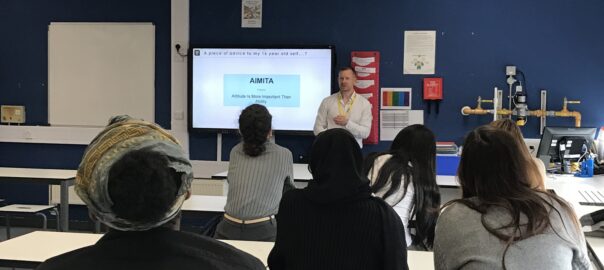Working towards a food-secure future

By Joss Harrison, Mayor’s Fund for London Youth Board member
About me
I joined the Mayor’s Fund for London Youth Board because I wanted to be part of an organisation that puts young people’s wellbeing at the heart of its work. As part of my full-time role at the London School of Economics, I run a support group for bereaved students and serve as Communications Manager for the School’s Disability and Wellbeing Network (DAWN). This event inspired me as an opportunity to put the connection between food security and wellbeing more firmly on the map.
The aims of the event
On Wednesday 2 November, the Mayor’s Fund for London convened the 2022 London Food and Wellbeing Summit at London’s City Hall. This event brought together important stakeholders working in a range of interrelated spaces, including providers, local authorities, funders, and youth organisations.
This event struck at the very core of one of our most important priorities at the Mayor’s Fund for London: namely, to eradicate food insecurity and social isolation among children and young people in our city. In the context of a raging cost of living crisis, the continuing impacts of the COVID-19 pandemic, and an economy that often does not work in favour of young people, this event was both timely and urgent. The summit was simultaneously reflective and solutions-orientated, providing an opportunity to think about new, collaborative ways of tackling food insecurity, and to showcase best practice.
Critically, youth voice was at the forefront of the event. As a member of the Mayor’s Fund for London Youth Board, I can testify to the organisation’s commitment that decisions about young people should never be made without having them in the room. The event was attended by three fellow members of the Mayor’s Fund for London Youth Board, who noted the palpable energy in the room on the day. This reflects our commitment to young people’s representation and foregrounding their voices in the resolution of the problems that affect them – at every stage of the event, young people were visible and active participants.
The feature of the summit that most deeply resonated with me was the link that it drew between food insecurity and wellbeing. The dangers to our physical health posed by food insecurity and insufficient nutrition are self-evident. Less often considered, but no less serious, is the corrosive impact that food insecurity has on the mental health and emotional wellbeing of those who it afflicts. I know from my own work with young Londoners that there is a slow-burning mental health crisis plaguing the young people of our city. This reflects the importance of weaving a wellbeing angle into campaigns that may, on the face of it, seem unrelated – because in practice, the mental health crisis cannot be tackled in isolation.
The panel discussions
The day consisted of four panels, each chaired by a member of the Mayor’s Fund for London team. Each panel was composed of experts and stakeholders from a variety of backgrounds, including the charity sector, academia, sport, medicine, and business. The panels also gave a platform to young people, whose equal participation alongside professors, doctors, CEOs and directors reflected the fundamental importance of their experiences and insights.
The first panel of the day focused on the cost of living and its impact on young people. Panellists discussed the specific pressures that the current cost of living crisis is generating, but also stressed the need to retain a long-term focus. Food insecurity was a serious challenge among young Londoners before the current crisis and will persist after the current crisis has abated.
In the second panel, attention shifted from the impact of the cost of living crisis on young people to their potential role in responding to it. The firm message of this panel was that the involvement of young people in shaping provision must be non-negotiable. In particular, it stressed that solutions should be co-designed by young people, giving them a level of agency and involvement beyond just consultation.
The third panel highlighted the challenging issue of stigma and shame when it comes to food provision, which can be powerful barriers preventing people from seeking or accepting support. Panellists underlined the need to offer forms of support that are destigmatising. Involving young people in provision can be a critical means of reaching communities who might otherwise be reluctant to accept support. Another means of addressing the stigma around food is to deliver it through community spaces, thus emphasising a common need over that of any individual.
Finally, the fourth panel addressed the critical link between food security and wellbeing. Panellists argued that reducing food insecurity ought to be one pillar of a wider wellbeing strategy. Food security is a necessary condition of young people’s wellbeing; however, it is not the only condition that needs to be addressed. One of the critical conclusions of the day’s proceedings was on the need to provide wrap-around support alongside food provision to combat the mental and physical health challenges associated with food insecurity.
Moving forward
As one of the Youth Board members in attendance aptly noted, our ultimate aim is to achieve a society in which initiatives such as this one are no longer needed, because everyone’s basic needs are already fulfilled.
However, in the immediate term, support is urgently needed. This event facilitated conversation on the development of a framework under which young people, food providers, youth organisations, local authorities and funders could work together to address the critical issue of food insecurity. The Mayors Fund for London and those in attendance will continue working across our broad scope of aims, doing work on the ground to strengthen communities while also advocating for policy change and government support. This raises the hopeful prospect of a truly collaborative response to food insecurity that is more than the sum of its parts.



